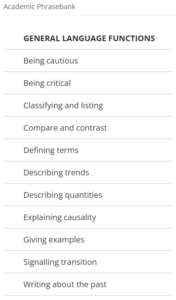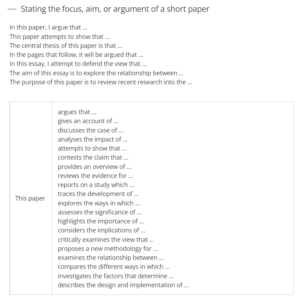Paraphrasing
BACKParaphrasing is an essential communication skill whose importance is often underestimated by students, leading to poor quality work and potential issues of academic misconduct.
What is paraphrasing?
Paraphrasing means expressing someone else’s ideas in your own words.
Why should I paraphrase?
There are three main reasons why you should paraphrase:
1. You need to use the work of experts (academic researchers, industry professionals) to support your arguments. By paraphrasing their ideas, you are making your work original; you are able to integrate their ideas into your line of argumentation; you are communicating in your style, your voice.
2. In order to paraphrase, you have to process the information deeply in your brain, which leads to deep and permanent learning. Simply put: the more you paraphrase, the more you learn.
3. When you paraphrase, you avoid issues of copy-paste and plagiarism.
Why is a paraphrase better than a “direct quotation”?
A “direct quotation” – when you copy the original words and enclose them in “speech marks” – is not original to you, you are not deeply processing the information and there is a greater risk of academic misconduct if you forget the “speech marks” and the APA style in text citation.
How should I paraphrase?
Good paraphrasing is not easy and takes time. Writing a paraphrase directly from the original is difficult, so this is the recommended process:
- Read the original carefully several times to ensure you fully understand the meaning.
- Note down the ideas or information you want to use.
- Write your paraphrase from your notes (not looking at the original).
- Check your paraphrase against the original to make sure you have captured the key information.
- Finally, integrate your paraphrase into your text with an APA style in text citation of your source and a short comment from you about the paraphrased information (i.e., what is the significance of this information? How does it support your point of view, your argumentation?).
How can I change the language of the original?
There are many good academic writing websites giving guidance. One of the most reliable is Scribbr.
They recommend that you should:
- Start your first sentence at a different point from that of the original source.
- Use synonyms (words that mean the same thing).
- Change the sentence structure (e.g., from active to passive voice).
- Break the information into separate sentences.
Reference: Scribbr. (n.d.). How to paraphrase sources. https://www.scribbr.com/citing-sources/how-to-paraphrase/
Another website that aims to provide you with examples of some of the phraseological ‘nuts and bolts’ of writing, organised according to the main sections of a research paper or dissertation – Academic Phrasebank

Why should I avoid online automatic translators?
When you enter text in one language in order to get the equivalent in English, the automatic translator proposes an English text it has found on the internet. If you then incorporate this text into your work, Turnitin will identify the source of the English text and you will face issues of academic misconduct. Automatic translators are acceptable for single words, but you will face trouble if you use them for longer phrases.


